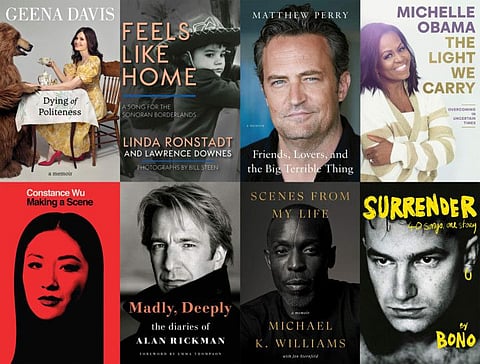Fall books a broad mix of literary and commercial favourites
For months, Colleen Hoover’s millions of fans have been talking up ‘It Starts With Us’

Anticipation for one of the fall’s likeliest bestsellers has been growing all year.
For months, Colleen Hoover’s millions of fans on TikTok, Instagram and elsewhere have been talking up and posting early excerpts from her novel “It Starts With Us.” By summer, the author’s sequel to her bestselling “It Ends With Us” had already reached the top 10 Amazon.com.
It might have climbed higher but for competition from other Hoover novels, including “Ugly Love,” “Verity” and, of course, “It Ends With Us,” the dramatic tale of a love triangle and a woman’s endurance of domestic abuse that young TikTok users have embraced and helped make Hoover the country’s most popular fiction writer.
Hoover’s extraordinary run on bestseller lists, from Amazon.com to The New York Times, has been Beatle-esque for much of 2022, with four or more books likely to appear in the top 10 at a given moment. “It Starts With Us” had been so eagerly desired by her admirers — CoHorts, some call themselves — that she broke a personal rule: Don’t let “outside influences” determine her next book.
“I never allowed myself to entertain a sequel, but with the amount of people emailing me every day and tagging me in an online petition to write about (those characters), their story began to build in my head in the same way my other books begin,” she told The Associated Press in a recent email. “Eventually I craved telling this story as much as I did my other stories, so I owe the readers a big thank you for the nudging.”
Hoover’s new book should help extend what has been another solid year for the industry. Booksellers are looking forward to a mix of commercial favourites such as Hoover, Anthony Horowitz, Beverly Jenkins and Veronica Roth alongside what Barnes & Noble CEO James Daunt calls a “really strong” lineup of literary releases, including novels by Ian McEwan and Kate Atkinson.
The fall also will feature new fiction from Nobel laureate Orhan Pamuk and Pulitzer Prize-winners Elizabeth Strout and Andrew Sean Greer. Celeste Ng’s “Our Missing Hearts” is her first novel since “Little Fires Everywhere.” Story collections are expected from George Saunders, Andrea Barrett and Ling Ma, along with novels by Percival Everett, Barbara Kingsolver, Kevin Wilson, N.K. Jemisin, Lydia Millet and Yiyun Li.
Joe Concha’s “Come On, Man!: The Truth About Joe Biden’s Terrible, Horrible, No-Good, Very Bad Presidency” is the most colourfully named of the latest round of books attacking an incumbent president — a long and profitable publishing tradition. But the most high-profile works of political reporting dwell on Biden’s predecessor, Donald Trump, among them “Confidence Man,” by The New York Times’ Maggie Haberman, and “The Divider: Trump in the White House, 2017-2021,” by Peter Baker of the Times and Susan Glasser of The New Yorker.
Michelle Obama’s “The Light We Carry” is her first entirely new book since her worldwide bestseller from 2018, “Becoming.” Benjamin Netanyahu’s “Bibi” is the first memoir by the former Israeli Prime Minister, while American politicians with new books include Rep. Cori Bush of Missouri, Sen. Ted Cruz of Texas and Texas gubernatorial candidate Beto O’Rourke.
Celebrity books include Bono’s “Surrender,” Matthew Perry’s “Friends, Lovers, and the Big Terrible Thing” and Geena Davis’ “Dying of Politeness.” Bob Dylan reflects upon an art form he helped reinvent in “The Philosophy of Modern Song,” while the title of Jan Wenner’s memoir invokes the Dylan classic that helped inspire the name of the magazine he founded, “Like a Rolling Stone.”
History books will cover the famous and the overlooked. Among the former are Pulitzer-winner Jon Meacham’s “And There Was Light,” the latest entry into the canon of Abraham Lincoln scholarship, and Pulitzer-winner Stacy Schiff’s biography of Samuel Adams, “The Revolutionary.” Fred Kaplan, who focused on Lincoln’s prose in “Lincoln: The Biography of a Writer,” now assesses Thomas Jefferson in “His Masterly Pen: A Biography of Jefferson the Writer.”
Releases highlighting those less remembered include Kevin Hazzard’s “American Sirens: The Incredible Story of the Black Men Who Became America’s First Paramedics,” and Katie Hickman’s “Brave Hearted: The Women of the American West.” With the overturning last summer of Roe v. Wade, Laura Kaplan’s “The Story of Jane” is a timely reissue of her 1995 book about the underground abortion counseling service founded in Chicago in 1969, four years before the Supreme Court’s historic Roe ruling.
Bruce Henderson’s “Bridge to the Sun” centers on the recruitment of Japanese-Americans, some of whom had been in internment camps, to assist in US intelligence gathering during World War II.
“It was really hard to research because many of them had been working on top secret projects, and, even after they had been discharged, were reminded that they were under the National Security Act and that military secrets had to be kept,” Henderson says. “We had to do a lot of digging and contact families and see what the veterans had left behind. Of the six guys that I follow in my book, only one was still alive.”
Sign up for the Daily Briefing
Get the latest news and updates straight to your inbox


